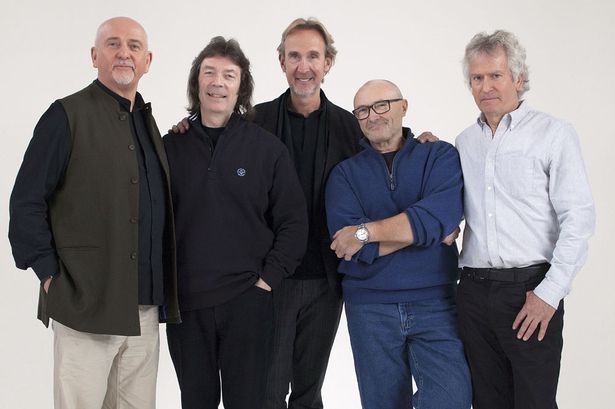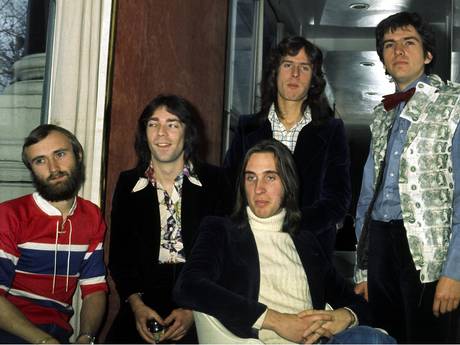| |
Taken from The Independent (Oct 10, 2014)
Seventies prog rockers Genesis are back, but are they welcomed?
Even the partial return of Genesis provokes radically mixed emotions.
by Nick Hasted

In their defence, there would be almost universal interest in this quintet
touring one last time and a line-up with Phil Collins centre-stage
would attract millions of fans |
The sight of Peter Gabriel, Phil Collins, Tony Banks, Mike Rutherford and Steve Hackett lined up in a studio, albeit only to reminisce for a documentary, evokes both nostalgia and loathing. There would be almost universal interest in this quintet touring one last time. A line-up minus their original singer, Gabriel, with his replacement Phil Collins centre-stage, would also attract millions of fans. Millions more would wake screaming at the thought, believing Collins was the musical war criminal who murdered the Eighties. Even on BBC2’s documentary, out on DVD next month, Collins has the haunted look of a man walking the streets in defiance of the accusing tap on the shoulder that’s sure to come. Paul Heaton’s recent song “When I Get Back to Blighty” has no doubt of his fate: “Everyone around us agrees that Phil Collins must die.”
“I don’t know why there is a stigma about liking Genesis,” the comedian Al Murray, a fan, muses on Genesis: Then and Now (renamed Genesis: Sum of the Parts on DVD). The perceived fault lies first in the gulf in musical personality between Gabriel and Collins, which grew more pronounced after the former quit in 1975. Even Pink Floyd’s mutations under Syd Barrett, Roger Waters and David Gilmour had an internal logic. It’s hard to find one connecting 90-minute concept album The Lamb Lies Down on Broadway (1974) to catchy single “Invisible Touch” (1986).
Gabriel’s Genesis was formed at Charterhouse with Surrey schoolmates Tony Banks and Mike Rutherford in 1966, part of a line-up that stabilised with the recruitment of guitarist Steve Hackett and drummer Collins in 1970. The unworldly, highly patrician nature of the band Collins joined was typified when they took picnic hampers on their first tour, blissfully ignorant of the motorway cafes other rockers made do with. In 1974, Gabriel could be found living in one of the Queen’s grace-and-favour apartments in Kensington Palace, distractedly stroking his cats, Bruce and Stockhausen; his first wife Jill Moore’s father was the Queen’s Secretary. His subsequent creation of the wonderful world music festival Womad has an element of noblesse oblige.
There is a pastoral charm common to Genesis’s progressive-rock peers in surreal epics such as the 23-minute “Supper’s Ready” from Foxtrot (1972), enhanced by Gabriel’s sylvan flute-playing, and mixing satirical sharpness and whimsy in standard counter-culture fashion. Its science-fiction narrative is as dubiously coherent as its bolted-together, studiously arranged musical components. Tony Banks was Genesis’s leader in the latter department, and smarted as Gabriel’s magnum opus, The Lamb Lies Down on Broadway, left him feeling sidelined. Gabriel’s theatrical stage presence, wearing his wife’s dress and a fox-head mask, or costumed as a sunflower, also made him the undisputed star of an otherwise anonymous band. The funniest part of their 2014 reunion is watching the haughtily dislikeable Banks barely concealing his still simmering exasperation at Gabriel’s Seventies dominance, to the singer’s weary bemusement.

Genesis: Phil Collins, Steve Hackett, Mike Rutherford, Tony Banks
and Peter Gabriel in 1975 (Andre Csillag/REX) |
There was a huge class element to the arrival of London grammar-school boy Collins in the band. He found a “highly strung, tightly wound band. It was like they’d been tied up at school.” These emotions were intrinsic to their music. The coming schism between Gabriel’s and Collins’s Genesis was summed up as they discussed lack of crowd noise on Genesis Live (1973). “There is a Marcel Marceau album which is absolutely silent, with clapping at the end,” Gabriel noted approvingly. “But who buys it?” Collins asked.
Genesis’s popularity leapt when Collins replaced Gabriel as singer and main lyricist in 1975. But it was in the Eighties that the band’s transformation and vilification became complete. The qualities which Collins, and by extension Genesis, would be condemned for were clear strengths at first. It was while playing on a Gabriel solo album that Collins and engineer Hugh Padgham hit on their huge, “gated” drum sound. Transplanted to Collins’s first solo single, “In the Air Tonight” (1981), it’s sparely used thunder in a menacing production masterpiece. “Mama” and “That’s All”, the singles from Genesis (1983) which shot the band to superstardom, also crackled with experimental malevolence. Collins’ solo career meanwhile flourished thanks to his genuine, Everyman persona, which led to him starring in the Great Train Robbery film Buster (1988).
It was somewhere over the Atlantic, as Collins flew between the London and Philadelphia legs of Live Aid in 1985, that his reputation, and the Eighties as a whole, curdled. His massive drum sound became a production plague, making most of the decade’s albums unlistenable. Collins became equally ubiquitous. He is probably as thankful as us now that Michael Caine’s idea for a film starring himself, Collins, Bob Hoskins and Dennis Waterman as loveable London brothers was quietly smothered. Collins’s initially amiable, persona was picked apart. His dislike of paying tax under Labour governments and subsequent move to Switzerland upon Blair’s election were unconnected, he insists. But a meanness and bitterness was drawn from him under pressure. In Britain especially, he admits sadly, he is shorthand for why “people didn’t like the Eighties”. Rutherford’s soporific, sentimental side-project Mike + The Mechanics is an even better one. Genesis itself collapsed creatively under the weight of its members’ growing blandness.
Collins, unable even to drum after an injury on Genesis’s last reunion tour in 2007, cuts a more sympathetic, chastened figure today. The musical wars he was a criminal in are no longer fought so fiercely, anyway. His Genesis had its strengths. And the ached-for reunion with Gabriel, the band’s king across the water, forgets that his version too could be wearisome and bloated. Chatting about the old days is where this sometimes brilliant, sometimes objectionable band’s comeback should end.
‘Genesis: Sum of the Parts’ is out on 17 November
|
|